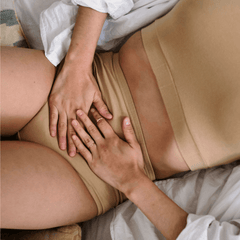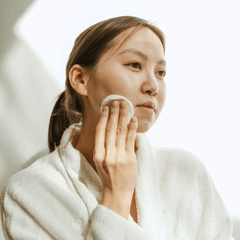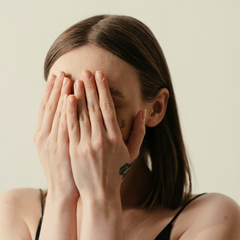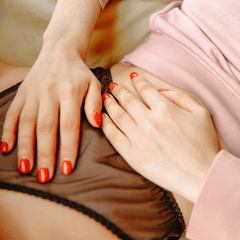How Do Acne Medications Work?

Dealing with acne can take a toll on your mental health. Studies have shown that even mild acne can lead to feelings of low self-esteem, depression, and thoughts of self-harm. At Cocoon, we're committed to offering effective supplements and educational content to help you take control of your skin health. In this blog post, we'll outline the main topical and oral prescription acne medications, how they work, and key considerations for each, so you can make a more informed decision about the best path forward for your unique needs.
TOPICAL ACNE MEDICATIONS
Topical acne medications are usually the first line of defence when it comes to acne medication. These treatments are applied directly to the skin and work by penetrating the pores. They tend to be gentler on the skin and body than oral medication, and typically come with fewer side effects.
TOPICAL RETINOIDS
Retinoids are a synthetic form of Vitamin A. In their topical form, they work by increasing skin cell turnover to create new healthy skin cells more frequently. This rapid exfoliation helps prevent dead skin cells from clogging pores and causing pimples.
Retinoids have proven to be particularly effective on blackheads and whiteheads. This topical treatment also comes with the added benefit of collagen and elastin stimulation, helping to prevent fine lines.
Tretinoin (aka retinoic acid) is one of the most common prescription retinoids. It comes in cream, gel, or liquid form, in varying degrees of strength. Retinol is a type of over-the-counter retinoid that’s become increasingly popular over the past few years. It’s gentler on the skin, but arguably less effective than prescription variants.
Key considerations:
- It can cause acne to get worse before it gets better. This is because the pimples that have started developing beneath the skin’s surface are emerging more rapidly.
- It can irritate the skin when you first start using it, causing mild to moderate redness, dryness, peeling, itchiness, burning, or stinging.
- When used in combination with certain ingredients, it can increase skin dryness or reactivity (ex. salicylic acid) or it can degrade the retinoid (ex. benzoyl peroxide).
- It causes sensitivity to sunlight by stripping away the outer layer of skin cells. Wearing sunscreen daily is a must.
TOPICAL ANTIBIOTICS
Topical antibiotics work by killing excess skin bacteria. When bacteria infiltrates clogged pores, it can cause pimples to become inflamed. For that reason, topical antibiotics are an effective treatment option for reducing inflammation related to acne. However, they won’t help to prevent pores from clogging in the first place, meaning breakouts may still occur.
When topical antibiotics are used over long periods of time, the skin can develop antibiotic resistance (when bacteria develop the ability to defeat the drug designed to kill it). To prevent this, they’re often formulated in combination with other ingredients like benzoyl peroxide or retinoids. These other ingredients can also help address the clogged pores that go untreated by antibiotics.
Clindamycin and erythromycin are the most used topical antibiotics for acne. They come as a foam, gel, liquid, lotion, or pledget (swab), in varying degrees of strength. The main difference is that erythromycin comes with a slightly higher risk of antibiotic resistance. Combination examples include clindamycin + benzoyl peroxide, clindamycin + tretinoin, and erythromycin + benzoyl peroxide.
Key considerations:
- It can cause your skin to develop antibiotic resistance, especially when used alone. Applying alongside benzoyl peroxide or certain retinoids can help prevent this resistance.
- It can cause mild skin irritation in the form of dryness and flakiness, especially when used with benzoyl peroxide or retinoids.
ORAL ACNE MEDICATIONS
Oral acne medications are usually prescribed for moderate to severe cases of acne, or in situations where acne has not responded to previous treatment. These treatments are ingested, often as a pill, and are typically more effective than their topical counterparts, especially for hormonal acne since they treat the issue from an internal perspective. However, they don’t necessarily rectify hormone imbalances (meaning other hormonal symptoms outside of acne may persist). Many of these oral treatments also can’t be consumed for long periods of time without negative consequences. Therefore, in many ways they are a temporary solution.
BIRTH CONTROL PILLS
While originally designed to prevent pregnancy, birth control pills (aka oral contraceptives) have become one of the more effective and commonly prescribed acne medications. This is likely because of their impact on the root cause of hormonal acne - hormones.
The pill is formulated with synthetic estrogen and progesterone (called progestin). By taking the pill each day, you’re increasing estrogen and progestin in your body, which then suppresses other hormones and stops ovulation. This tricks your body into thinking it’s already pregnant, preventing actual pregnancy. In fact, when you’re taking the pill, your period (the week where you take sugar pills or no pills) is not a real period, it’s a withdrawal bleed.
When it comes to acne, this increase in estrogen and progestin helps reduce sebum (and acne) in two ways:
- By stopping ovulation, it prevents the ovaries from producing androgens. Since certain androgens are needed for sebum production, fewer androgens mean less sebum production, and less opportunity for clogged pores and acne.
- It increases SHBG (sex hormone binding globulin). This protein binds to estrogen, DHT, and testosterone so that they can’t bind to receptors. In the case of DHT, this inhibits its sebum-increasing abilities.
For these reasons, many women experience an improvement in their hormonal acne when they go on the pill, particularly if the hormonal imbalance causing their acne is driven by high androgens.
However, if the root cause of your hormonal imbalance and ensuing acne is high estrogen (an imbalance known as estrogen dominance), it’s possible that the pill can worsen your hormonal imbalance and, in some cases, your breakouts. This is because the synthetic estrogens in the pill contribute to already high harmful levels of estrogen. So, even if you have high estrogen and the effects of the pill are able to mask your acne, chances are you will experience other symptoms of estrogen dominance, like painful periods or mood swings.
Key considerations:
- By causing our natural production of certain hormones to turn off, it can result in anovulation (no ovulation) and hormone deficiencies long after discontinuing the pill.
- It can increase your risk of blood clots, heart attacks, and high blood pressure.
- It can cause side effects that include (but aren't limited to) breast tenderness, headaches, nausea, bloating, weight gain, mood changes, decreased sex drive, and depression.
SPIRONOLACTONE
Spironolactone was originally prescribed as a medication for high blood pressure, heart failure, hyperaldosteronism, and fluid retention. It helps your kidneys remove more fluid and salt from your blood through your pee without losing too much potassium. However, it’s been increasingly prescribed for acne due to its ability to also block androgen receptors. By blocking these receptors, it can reduce oil production, and help prevent breakouts.
Again, due to the nature of this treatment, it’s proven to be effective in treating hormonal acne caused by high androgens. However, if the root cause of your acne is high estrogen, it won’t address this issue and you may deal with continued breakouts or other symptoms of high estrogen, like painful periods or mood swings.
Spironolactone is prescribed under the brand name Aldactone. It’s not prescribed to treat acne in men due to side effects. Men have developed breasts while taking this medication to treat acne.
Key considerations:
- It’s a diuretic, so you’ll find yourself urinating more often.
- It can cause birth defects if taken while pregnant. It’s recommended that at least one form of birth control is used alongside this treatment.
- It can cause side effects that include painful or irregular periods, breast tenderness or enlargement, fatigue, headaches, and dizziness.
- Since it prevents your body from eliminating potassium, combining it with too much potassium can be dangerous.
ORAL ANTIBIOTICS
Like topical antibiotics, oral antibiotics help reduce the number of acne-related bacteria trapped in and around hair follicles and sebaceous glands. Again, because bacteria inside clogged pores is what generally causes inflammation, this type of treatment can help with inflamed acne, but won’t do anything to address pore blockages.
Oral antibiotics are prescribed over topical antibiotics when acne is severe. This is because they’re usually more effective, but do increase the likelihood of side effects like antibiotic resistance. For that reason, they generally can’t be used for as long as topical antibiotics. Like topical antibiotics, they’re usually taken in combination with another form of treatment (like benzoyl peroxide or retinoids) to decrease the chances of antibiotic resistance and help address clogged pores. Oral antibiotics are also often prescribed for back acne, since it’s hard to apply cream in that area.
Tetracycline and its derivatives, like doxycycline and minocycline, are the most prescribed medication in this category.
Key considerations:
- It can lead to antibiotic resistance, so shouldn’t be used for long periods of time.
- It can affect the bacteria in your gut, clearing out a lot of the good ones your body needs to eliminate toxins.
- It can cause an upset stomach. Taking with foods can help reduce this side effect, but may also decrease absorption of the medication.
- Some forms can cause dizziness, nausea, vomiting, and other side effects.
- It can cause sensitivity to sunlight.
- It can cause vaginal yeast infections.
- It can reduce the effectiveness of birth control pills.
ISOTRETINOIN
Isotretinoin is an oral retinoid. Like topical retinoids, it’s a synthetic form of Vitamin A that works by shrinking sebaceous glands so they produce less oil, and increasing cell turnover. That said, it’s much more potent than topical retinoids. For that reason, it's typically more effective than topical retinoids, but arguably the most serious prescription acne medication in terms of the potential side effects.
Because it’s such a powerful drug, it’s typically only used for the treatment of severe cases of acne that haven’t improved with other treatments. Once you stop taking isotretinoin, the beneficial effects generally last longer than other prescription acne medications. However, in some cases, additional rounds of treatment are eventually required.
Accutane is the most well-known brand name of isotretinoin, but is no longer sold, in large part due to lawsuits over its side effects. It’s now sold under a variety of brand names, Epuris being the most popular brand name in Canada.
Key considerations:
- It can cause acne to get worse before it gets better. This is because the pimples that have started developing beneath the skin’s surface are emerging more rapidly.
- It can cause serious birth defects if taken while pregnant. It’s recommended that two forms of birth control are used alongside this treatment.
- It’s been linked to several possible mental health side effects, including depression, anxiety, suicide and suicide attempts, psychosis, and exacerbation of bipolar disorder.
- It can cause dry or itchy skin, dry or cracked lips, nosebleeds, thinning hair, excessive peeling, and muscle aches and pains.
- It can cause sensitivity to sunlight.
- In severe cases, side effects can include (but aren’t limited to) headaches, stomach pain, chest pain, dry/red/itchy eyes, vision problems, and jaundice.
DISADVANTAGES OF ACNE MEDICATION
Medication has proven to be an effective acne solution for some, especially those dealing with severe cases. If you’ve exhausted your over-the-counter options and are still struggling to find a solution that works, it may be worth exploring. That said, it’s important to clearly understand the drawbacks before racing towards what seems to be a powerful quick fix. Here's a short summary.
MOST MEDICATIONS COME WITH POTENTIAL SIDE EFFECTS
This doesn’t mean you’re guaranteed to experience them, but there is some risk. Some are minor (like dry or flaky skin) and some are major (like disruption of your gut microbiome or possible birth defects). In certain cases, there are additional medications prescribed to help avoid the side effects of the first. For instance, birth control is often prescribed alongside medications that may cause birth defects. Unfortunately, these secondary medications can come with their own side effects.
CONVENTIONAL MEDICINE GENERALLY VIEWS ACNE AS A SKIN CONDITION
This means that most topical and oral medications work by treating the skin (or, in other words, the surface-level symptom). However, if your acne is a symptom of underlying imbalances or disharmony in the body (which it usually is), treating the skin itself usually won’t solve the root issue. Medication can temporarily alleviate acne, but, unless the medication is applied or consumed continually, your acne will most likely return.
TAKING CERTAIN MEDICATIONS CAN WORSEN HORMONE IMBALANCES
If the root cause of your acne is a hormone imbalance, taking certain medications over long periods of time can worsen the imbalance by disrupting your body’s detoxification process. Certain medicines are broken down in the liver, and if your liver is exerting more energy on breaking down these inputs, there’s less energy available to process excess hormones and other toxins. They can also impact the gut. Antibiotics, for example, can destroy beneficial bacteria in the gut, leading to digestive issues that can make it more difficult for your body to eliminate excess hormones and other toxins. The result isn’t necessarily worsened acne; the medication may help alleviate that particular symptom, but other symptoms related to the hormone imbalance may become more evident, like painful periods or mood swings.
IF PREGNANT OR BREASTFEEDING, IT'S OFTEN ADVISED TO AVOID ACNE MEDICATION
If you’re pregnant or breastfeeding, you’ll probably want to avoid acne medication altogether. We recommend speaking with your doctor to confirm what options are available to you.
NATURAL SUPPLEMENTS
It’s important to note that there are other options outside of medication, namely natural supplements. While many people believe that natural supplements aren’t nearly as effective as medication, the truth is that nature is so much more powerful than we think. There are ways we can naturally nourish our bodies to bring them back into balance, without side effects or long terms consequences.
There are loads of natural skin supplements available over the counter. Most are formulated with herbs, vitamins, and other ingredients that can help improve the look and feel of your skin, but they don’t directly address the root cause of hormonal acne - hormonal imbalances.
Balance, on the other hand, is a natural skin supplement that’s proven to directly support healthy estrogen, in order to rebalance hormones and prevent breakouts. It’s designed for women and men who have hormonal acne caused by high estrogen. While not all acne is caused by high estrogen, it is a common root cause, especially among adult women with acne around their chin, mouth, or jawline. If you’re curious to know whether your acne could be caused by high estrogen, take our free hormone imbalance quiz.
Balance is formulated with DIM, Glutathione, and Calcium D-Glucarate. These ingredients work together to metabolize, process, and eliminate these excess estrogens, to avoid the acne-causing hormonal fluctuations driven by high estrogen.
With Balance, there’s no concern of irritated skin, antibiotic resistance, gut problems, mental health issues, or birth defects. It’s also not a band-aid solution. By naturally targeting the root cause, Balance provides long-term results when it comes to reducing both acne and other symptoms of estrogen dominance.
Key considerations:
- It is possible for acne and other symptoms to worsen within the first few days to first few weeks of taking Balance.
- Rare, short-lived detox symptoms may occur, including darkened urine, gas, headaches, brain fog, or fatigue, as well as feeling achy or irritable, or experiencing changes in stool.
- You should not take Balance if you are pregnant or breastfeeding, or if you are under the age of 18.
For a deeper dive into non-toxic topical ingredients that can support your skin while you're addressing internal imbalances, check out these natural topical treatments for hormonal acne.
FINDING THE RIGHT ACNE SOLUTION
We strongly believe that natural healing is possible, and hope that natural options become more widely adopted as a first line of defence when it comes to acne, given the side effects and long term consequences that come with some medications. That said, our goal is to ensure you feel confident in your skin, no matter what course of action you choose to take.
The bottom line is, you know your body best. Combining that knowledge with careful research will help you make an informed decision about the course of treatment that makes the most sense for your needs. It may also take some trial and error, so be patient while you explore options and always show yourself compassion along the way.
Finally, before starting any new acne regimen, you should always speak with your doctor to help determine what’s right for you.





